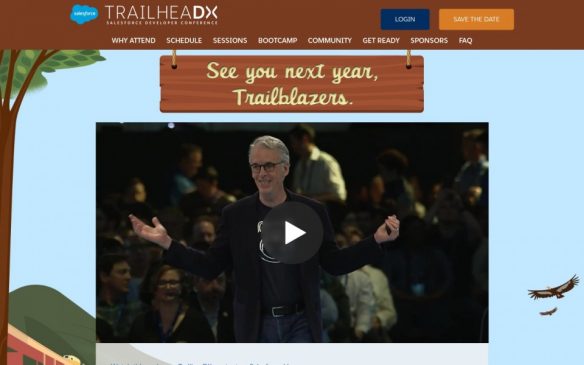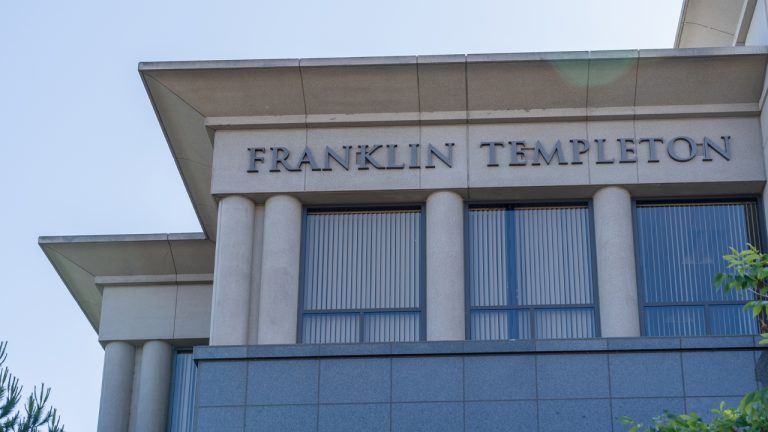Salesforce is rolling out a new product called Salesforce Blockchain – a low-code platform that enables organizations to share verified, distributed data sets across a trusted network of partners and third parties.
Salesforce Blockchain is currently available to select design partners and expected to become generally available in 2020.
“We help companies build for the future by making breakthrough technology accessible and easy to use—today we are doing just that with Salesforce Blockchain,” said Bret Taylor, President and Chief Product Officer, Salesforce. “Now, companies will be able to create new ecosystems and achieve new levels of interconnectivity through trusted partner networks.”
By bringing blockchain to the world’s #1 CRM platform, companies can create blockchain networks, workflows and apps that deliver entirely new customer experiences. Salesforce Blockchain made its debut today at TrailheaDX, Salesforce’s fourth annual developer conference.
Today, connectivity is redefining how businesses operate and the experiences that customers expect. To deliver this, companies must harness and share massive amounts of data with an ever-evolving network of partners and third parties, all without sacrificing trust. This has introduced unnecessary levels of cost and inefficiencies. Blockchain solves this “trust gap” by delivering a distributed ledger that saves, traces and authenticates data across every partner—or node—in the network. Organizations in all industries can leverage blockchain for a variety of use cases like asset tracking, credentialing and verification and authentication of goods. By combining CRM workflows with blockchain data, companies can create new business processes and models that span sales, service, marketing and beyond to accelerate the speed of business.
Create Trusted Partner Networks with Salesforce Blockchain
Salesforce Blockchain is a low-code blockchain platform that extends the power of CRM. Built on the open source technology of Hyperledger Sawtooth and deeply customized for Salesforce Lightning, Salesforce Blockchain lowers the barrier for creating trusted partner networks. Salesforce Blockchain enables companies to easily bring together authenticated, distributed data and CRM processes. With Salesforce Blockchain anyone can:
- Build Networks with Clicks—Easily build and maintain blockchain networks, apps and smart contracts—unique to every business—using Salesforce’s powerful low-code capabilities. Customers can now create and share a blockchain object in the same process as any CRM data object—with clicks, not code.
- Automate Data with Lightning Platform—Make blockchain data actionable through native integration with Salesforce. Layer complex blockchain data on top of existing sales, service or marketing workflows like search queries and process automation. Even more, companies can now run Einstein-powered artificial intelligence algorithms that integrate blockchain data into sales forecasts, predictions and more.
- Engage Partners Easily—Lower the barrier to entry for partners, distributors and intermediaries to leverage Salesforce Blockchain. Companies can now pull in APIs, pre-built apps and integrate any existing blockchains with Salesforce. With an intuitive engagement layer, companies can also easily interact with and add third parties to their blockchain with a few clicks and a simple authentication—creating trust networks.
Customers using Salesforce Blockchain today include:
Arizona State University
A leading public research institution, Arizona State University is using Salesforce Blockchain to design and create an educational network that enables universities to verify and securely share information. This network will expand the ability for universities and colleges to serve learners, for example, by saving student transcripts and accomplishments into a Learner Trust Record on a unified ledger, a tool that will create a record of the entirety of a learner’s accomplishments. With Salesforce Blockchain, Arizona State University seeks to give ownership and control of learner records to the learners themselves, while significantly reducing friction between institutions and allowing them to provide faster and more intelligent services to students.
“With Salesforce Blockchain, we expect that this educational trust network will allow us to better serve our diverse set of undergraduate and graduate student learners,” said Kent Hopkins, Vice President of Enrollment Services at Arizona State University. “This network has the potential to be a game-changer for integrated, seamless learning—increasing transparency of student achievements and ultimately making the exchange process of academic records easier for both learners and institutions.”
IQVIA
IQVIA, a leading global provider of advanced analytics, technology solutions and contract research services to the life sciences industry, recognizes that blockchain, as an emerging technology, could potentially impact the life sciences industry and healthcare. As such, IQVIA is collaborating with Salesforce to explore a variety of possible blockchain technology initiatives within this sector. One of those initiatives, using the Salesforce Blockchain, is specific to regulatory information management and drug label processing. Potential benefits from this initiative include cost savings via label automation and improved audit traceability; quality improvements based on agreed collaborative rules; enhanced security from immutable content sharing; and real-time insights.
“IQVIA is pleased to be working with Salesforce, building out its new blockchain platform, as we explore the potential it may bring to a number of use cases in our industry,” said Tal Rosenberg, senior vice president, Technology Solutions, IQVIA.
S&P Global Ratings
A leading provider of ratings, benchmarks, analytics and data for the global capital and commodity markets, S&P Global Ratings is leveraging Salesforce Blockchain to reduce the time it takes to review and approve new business bank accounts. By operating on a shared ledger of know-your-customer (KYC) data, S&P Global Ratings is able to bring multiple reviews together in one trusted location, providing a more transparent and auditable review process, for employees, partners and customers—ensuring that we engage only with verified organizations.
“The KYC reviews and approval process is very time consuming and requires multiple parties to ensure each business is evaluated accurately and completely,” said Chris Heusler, Global Chief Commercial Officer, S&P Global Ratings. “Leveraging Salesforce Blockchain, S&P Global Ratings has created a trusted network of reviewers, where everyone can work from a shared, transparent and auditable review process—completely reinventing and expediting how we do KYC reviews for our customers.”
- Learn more about Salesforce Blockchain here
- Take the Trailhead Salesforce Blockchain Trail here
- Read the blog post about Salesforce Blockchain here
- Tune into TrailheaDX to learn more about Salesforce Blockchain here
- CrowdEngine Teams Up With Polymath Adding Security Token Issuance to List of Crowdfunding Services – June 3, 2019
- Bitcoin Inc. CEO Morgan Rockcoon Busted – 21 Months in Prison and Fines – June 3, 2019
- Reshaping a Nation’s Logistics Sector: Singaporean Blockchain Company PLMP Cuts Multimillion Dollar Deal With Indonesia – June 3, 2019
- Swisscom TV Opens Blockchain-based Art Gallery – June 3, 2019
- Canadian Messaging Service Kik Burns $5 Million Fighting SEC Over Utility Tokens, Now Raising $5 Million More to Continue Battle – June 3, 2019
- Salesforce Introduces CRM Blockchain Platform For Selected Clients – June 3, 2019
- Block.one Plans to Tackle Pitfalls of Social Media With New Blockchain Community Called “Voice” – June 3, 2019
- CasperLabs and Ethereum on Proof of Stake Protocol at CryptoChicks in Toronto, family ran Hack-A-Thon for blockchain family – June 3, 2019
- World Economic Forum Inaugurates Global Blockchain Council to Address Lack of Well-Defined Rules for Working with Blockchain – May 29, 2019
- India’s First Blockchain Powered VoD Platform ‘myNK’ Launches At Cannes Film Festival – May 27, 2019
- New Zealand’s Cryptopia Exchange Packs It In – Announces Liquidation – May 15, 2019
- Canadian Blockchain Expert Alex Tapscott and NextBlock Global Limited to Pay $1M for Misleading Investors – May 15, 2019
- ObEN Launches AI Newscaster With 3D “Satoshi” Avatar to Deliver Content via PAI News App – May 14, 2019
- Leading Freelance Platform Moonlighting Announces First Blockchain Integration Partner – Teams with HireVibes For EOSIO Solution – May 14, 2019
- Polish-UK Blockchain Company Billon awarded €2 million euro from EU to build DLT Document System – May 14, 2019
- City of Belfast and Colu Team up to Create City Loyalty Token to Boost Local Economy and Environment – May 8, 2019
- Fidelity Investments – to Launch Cryptocurrency Trading Desk Soon – Recent Report Shows Clients Want To Trade Digital Assets – May 8, 2019
- Consensys Accelerates Blockchain Investment Portfolio, Consolidates Investment Arms – May 8, 2019
- IBM to Track Fresh Shrimp on the Blockchain – May 8, 2019
- Binance Cryptocurrency Exchange Hacked for 7000 BTC (USD $40 million) – May 8, 2019
Also published on Medium.






